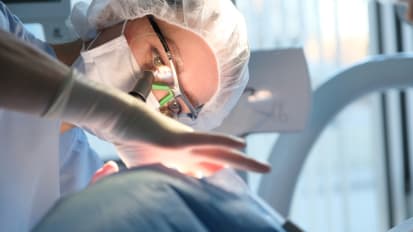Chapters
Transcript
[MUSIC PLAYING]
HEIDI CROW: Pre-treatment, peri-treatment, and post treatment. In pre-treatment, so your patient has been diagnosed with head and neck cancer. You're the treating dentist. What do you need to know? Well, you have to remove any sources of infection, active infection. You have to consider areas of potential infection. And the reality is, every tooth in the mouth has potential to be a source of infection at some point in this person's life. So you have to really look very carefully.
In terms of peri-treatment, most community dentist don't have to be involved in that. But the emphasis is going to be on hygiene and nutrition and palliation. And the dental team at Roswell does do peri-treatment for the head and neck cancer patients.
Post treatment. This is the patient that has had the treatment for head and neck cancer. The emphasis is going to be on preventive care. So that's very, very important. And it's also important to realize that you can treat these patients, but you have to be careful not to do something that could cause problems. So do no harm.
So pre-treatment considerations. Your dental treatment prior to this patient's cancer care depends on what the cancer care is. And so you have to determine the treatment plan. You have to call the oncologist. You can't just say, oh, the patient says, well, they're thinking about radiation. You gotta call the oncologist and find out what is the cancer treatment plan.
Is it just surgery? Is it radiation therapy? If it's radiation therapy, what kind of radiation therapy? What's the high dose going to be? What's the port? That's the area that the high dose radiation goes to. Those are the things you'll need to know to adequately treatment plan your patient. Is chemotherapy going to be involved? And with many of our larger cases now, it's a combination of all three.
Pre-treatment, the obvious stuff, remove teeth with poor prognosis. Severe periodontal disease, unrestorable caries, large periapical lesions, ideally, if they're going to get radiation, more than two weeks prior to radiation. So your patients sit there. I have a big cancer in my mouth. I'm supposed to start radiation in one week, and you tell me I have to now wait a couple of weeks for healing and that's going to delay my radiation? They don't want to hear it. So the sooner you can get on board with these patients and get the treatment moving, the better.
This is an easy treatment plan. So this lady has head and neck cancer. All of her teeth need to be extracted. Very simple. Think about alveoloplasty, though. Because if this person has radiation, and they will have radiation, you can't do alveoloplasty after their treatment.
This is a difficult one to treatment plan. Here's a gentleman. He's in his 80s. He's a physician. His brother has been his dentist through his life. He's got a tumor that's in the left side of his mandible. They're going to resect that part of his mandible. They're going to give him a free flap. He's got open margins on his crown and bridge. He's got recurrent decay. This is a much more difficult patient to try and decide what you should do pre-treatment.
Just some food for thought. Even if those upper left molars are in good condition, you may not want to keep them there, because they're going to be hitting that free flap post-healing.
If the treatment plan is just surgical, then your primary idea is, are there sufficient teeth for the patient to continue to function? Which teeth are vital to help retain post-operative function? So on this gentleman, he has a large tumor encasing an area of implants for his implant-supported denture. He's going to end up needing an obturator. If we can keep his other implants that are there, that may help him in retention of that obturator.
Radiation is the big one, because I like to say radiation concerns last forever. And there's evidence that over time, radiation changes can actually worsen oral complications after dental treatment. So I have to get my crystal ball out. Can the teeth in the port of high dose radiation remain for the lifetime of the patient? Well, this is really more difficult.
My 35-year-old HPV-positive patient will have a radio-sensitive tumor, which means that they will get radiation, most likely, and that will help. And they may live a long span of time. I can't guarantee any tooth in my mouth is going to last for my lifetime. So how can I guarantee it for someone else? If you have somebody who's older, medically complex, you can sort of think on a shorter frame. My 87-year-old may live 10 years, but maybe not. My 35-year-old may live quite longer.
What you want to do is make sure that there are no teeth that are in danger of requiring emergency care during radiation. And the issue with this is, if the radiation therapist has to stop radiation, send the person to you as the dentist, you treat the tooth, that causes a break in the treatment cycle. And that means the prognosis for cancer cure with that patient has just fallen. So you don't want to be partly responsible for that.
Chemotherapy concerns. Chemotherapy causes immune compromise. Any teeth abscess at risk of local infection during chemotherapy, any risk of septicaemia from current oral conditions.
So pre-treatment considerations. I think oral hygiene counseling is absolutely vital. I talk to patients about complications of therapy. I talk about nutrition and diet. I had a patient once who lost a lot of weight. She thought it was a good idea to drink sugared soda and Gatorade. She ended up losing all her teeth, and she didn't have to.
Prevention techniques, frequent recall appointments, fluoride therapy every day, consider varnish, possibly chlorhexidine rinses. The evidence doesn't really support it, but they now come alcohol-free, so you can consider it. Your patient will ask if it's covered by insurance, and the answer will be no. So the in-between treatment recall visits, you may want to consider doing some of your donated dental services.
Post treatment. New patient comes in. I had head and neck cancer, was treated in Tennessee or wherever it was treated. You have to find out what the treatment was. Was it surgical? Is there scarring? Is there trismus? You can have trismus and difficulty getting into take care of your patient's teeth. What's the rehabilitation potential? If it was radiation therapy, you have to contact the facility that did the radiation. You have to find out what type. You have to ask for dose maps. And there is an illustration of a dose map here. I won't go into it. Maybe Dr. Singh will. Combination of the above.
Everybody who's had radiation has to be on daily fluoride. Neutral sodium fluoride, brush for five minutes. Tell them to spit out. I tell them to take a cup and watch the evening news. Because nobody in their right mind is going to brush in front of the bathroom sink. You can use fluoride trays. There is no evidence that it's more effective. The fluoride is what's good.
This is just a summary slide of the different things in terms of short term and long term risks that occur with the different treatments that are there. Can you see, there's the most things are there under radiation, and the potential for osteoradionecrosis.
This is a patient that I screened prior to their radiation therapy about 25 years ago, early in my career. Gave them the fluoride, gave them all the information. Six months later, this is what he looks like. He went into a depression, stopped doing self care, didn't brush his teeth. So my crystal ball didn't work on that occasion. This is his saliva. You see the thick, ropey saliva. That is characteristic. He needed full mouth extractions afterwards.
So recall appointments every three months. Prescription fluoride therapy, chlorhexidine, silver diamine fluoride is possible. When do you do a denture, depends on the healing. Measure for trismus. If you start seeing a decrease in opening, send for physical therapy, and potential for osteoradionecrosis. Be aware of that.
Dr. [INAUDIBLE], Keith is going to talk about this in a few minutes, but dental extractions post-radiation are a risk with doses higher than 60 gray. It's in the mandible more than in the maxilla, posterior teeth more at risk than anterior. But you can't just let the tooth rot there because active infection is also a risk.
[MUSIC PLAYING]
As part of the Oral Cancer Conference 2019, Heidi Crow, DDS, shares dental concerns for patients with oral cancer. This lecture covers pre-treatment, peri-treatment, and post treatment.
Related Presenters

Interim Clinical Chief, Roswell Park Comprehensive Cancer Center
Interim Clinical Chief, Dentistry and Maxillofacial Prosthetics Department
Background Education and Training: 1985 - DMD, General Dentistry, University of Pennsylvania 1991 - MS, Oral Sciences, Temporomandibular Disorders and Orofacial Pain, University at Buffalo Residency: 1985-1986 - General Practice ...
Related Videos





